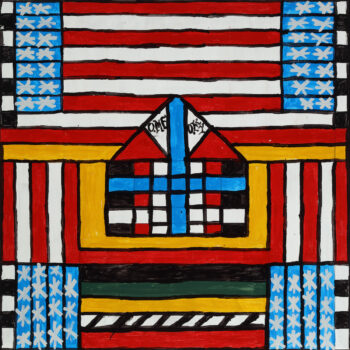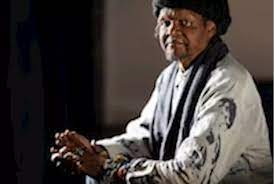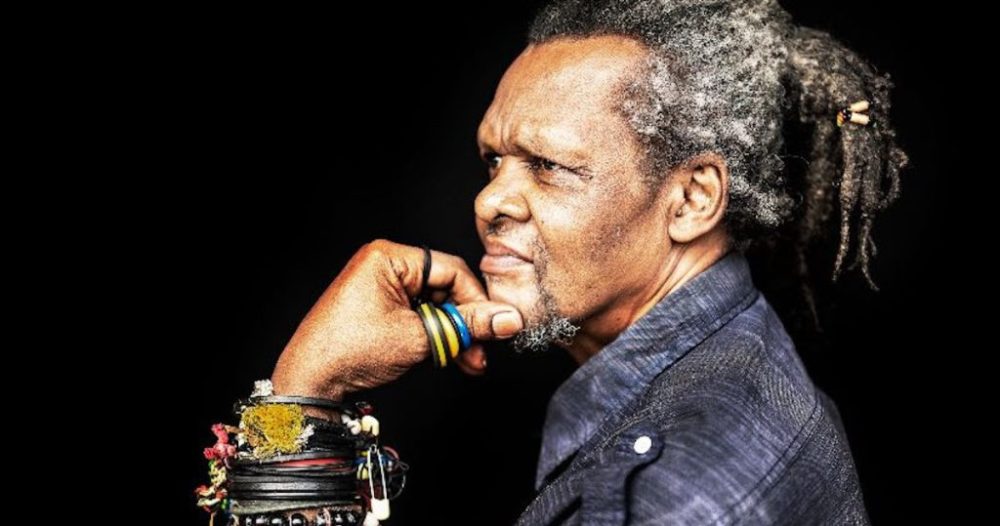Lonnie Holley Is Part Of The Wonder: Interview
Lonnie Holley has seen a lot in his 73 years. The American artist and musician is the seventh of 27 children and spent a significant part of his childhood at the Alabama Industrial School For Children during the 1950s and 60s.
 In addition to his work as a visual artist, Lonnie has been making music since at least 2010…most of it entirely improvised. His new album is titled Oh Me Oh My and features guest appearances by Michael Stipe, Sharon Van Etten and Bon Iver. Produced by Jacknife Lee, Oh Me Oh Me is a record only Lonnie Holley could make.
In addition to his work as a visual artist, Lonnie has been making music since at least 2010…most of it entirely improvised. His new album is titled Oh Me Oh My and features guest appearances by Michael Stipe, Sharon Van Etten and Bon Iver. Produced by Jacknife Lee, Oh Me Oh Me is a record only Lonnie Holley could make.
The 13th Floor’s Marty Duda spoke to Lonnie about making this stunning new record and the journey he took to get to this place.
Click here to listen to the interview with Lonnie Holley:
Or, read a transcription of the interview here:
MD: So I was hoping we could talk about your your new record Oh Me Oh My. Are you ready to do that?
Lonnie: Yes, I am
MD: All right. Very good. So I know you worked with a producer Jacknife Lee. And I guess start out by wondering how the two of you got to be working together and how you work together?
 Lonnie: Well, Jacknife has been a friend of mine. And also, my manager (Matt Arnett) and Jacknife had been communicating about maybe me getting out to Topica Canyon and cutting a record Topanga Canyon and cutting a record. And it finally happened after COVID kind of ceased, and they started getting back to normal. We was out in California and we had opportunity to go and work with Jacknife.
Lonnie: Well, Jacknife has been a friend of mine. And also, my manager (Matt Arnett) and Jacknife had been communicating about maybe me getting out to Topica Canyon and cutting a record Topanga Canyon and cutting a record. And it finally happened after COVID kind of ceased, and they started getting back to normal. We was out in California and we had opportunity to go and work with Jacknife.
MD: Okay. So what kind of discussions do you have with Jacknife when you’re talking about what you’re going to do for this record?
Lonnie: Well, we were interested in a few things. Mainly, because of everybody that was a lot of the collaborators was still being ended from traveling a lot. So we did we did things digitally more, right. I think that’s a great thing, because it just moved us into another level of collaborating, but we did it digitally. And everything was more like trials. And then how would this work versus how would that work? Moor Mother was actually there in Venice Beach. So she had enough time to come into the studio and work. Both of us we worked alongside each other. But the other collaborators. were more like piped in.
MD: Okay. Yep. Piped in, right. And with these collaborators, you mentioned Moor Mother. There’s also Michael Stipe and Sharon Van Etten. And Bon Iver…was it Jacknife who found them? Did you contact them? Who knew who and how did they get involved with those songs?
Lonnie: It was kind of a two way thing. Some of them knew me and were my friend and wanted to participate in on the new album. And some of them Jacknife knew. And he asked them for their participation. So it was more of , I call it a a worldly effort, because the music itself is more of a feeling piece of music. The music is made trying to sing things about the planet, about the humanities of the planet, about us and how our new brain set in the digital, and how we are making our different connections with our brains or without brain production. So that was put together with like, wow, they was right on time, really enjoy participating.
MD: And was that concept because of the pandemic? Or, or did the pandemic just kind of happen anyway and kind of feed into what you were planning on doing for this for this album anyway?
Lonnie: I think the pandemic fed into what we were doing. Because there was so much that was going on during the pandemic. And also, it was making the humans more fearful of their lifestyles. I mean, it didn’t matter what kind of lifestyle humans was having whether it was rich or poor. The pandemic didn’t care whether we was rich or poor, it was just hidden and bringing fear along with it. So I was actually taking that into consideration. And also by us having to be apart, and doing this new level of participation…because, you know, I’m an artist, first of all, I was demonstrating, and I was always interested in participation. But now we have to do, mostly playing virtual anyway. So that’s almost like proving to the virtual reality situation that we had to deal with, that we can make things happen on a musical level, just as well as we can make it happen on any other entertainment level.
MD: So my understanding is a lot of your lyric writing and songwriting kind of happens spontaneously in the studio. Is that true? And did that happen? If it is, did that happen on this record as much as it did previously?
Lonnie: I think it has always been happening. But what I cannot do is repeat myself. And I try not to even burden myself to even make that happen. So bringing them it’s almost like ‘extra extra read all about it’. Here was Lonnie Holley is going to have to play.
MD: So with a song like the title track, Oh Me, Oh My and you’ve got Michael Stipe in there doing his thing. How, how did it get started? How did you get his parts and interacted with your parts? And who was in the studio?
Lonnie: Michael’s parts and his lyrics was played to me. And I heard what he was doing. And then I lay down my tracks that they can be enhancing what he had already a played on. But also me thinking along the lines of ‘Oh Me Oh My,’ and how it had been used for generations for us as African Americans, blacks in America, coloreds of America and the Negroes of America all the way through slavery. Oh Me, Oh My was some words that was very, very special to our ways of surviving our hope for our further survival.
MD: So when you go to perform that, on stage, you mentioned that you can’t repeat yourself. So what happens it are you recreating on stage constantly?
Lonnie: I’m recreating but in moments. I’m there, wherever I am. I’m having an opportunity to ride around in the communities or in that part of the world. I’m getting the opportunity to see and kind of feel our growth as humanity. How not only. that is happening, but I’m getting a chance to see and explain to the audience all my fans are not so much to make them listen at me. But give them a bit of, of this is ‘Today’s Update’. Aftermath of storms, hurricanes, fires, earthquakes, explosions, overheated concepts, endless deaths in Brixton and up town that is built out of nothing but bricks, and then they are having to survive. And there’s so much harm and suffering, that is beyond just what we know as climate change. If the climate is changing, then the condition that it were wasn’t like, making everything as hot as they are. So what I’m saying is what you say, you know, you ask for the question. How is the work affecting our today?
MD: And you get up in the morning, listen to the news, read the papers, do whatever you do to gather information, and kind of process it in your own kind of artistic way throughout the day? Because my feeling is that just from talking to you, now that you’re constantly creating, whether it’s visually or musically
Lonnie: I’m always interested in what’s happening around the planet. Not so much just in my own only community, but around the planet. I’m a global parabola. And when you find me, sometime you will make you may find me here in America, next day, you know, Matt (Arnett, manager) got a job for us to go and do outside of America. So we’re constantly traveling the globe. And that means I am experiencing a lot more than the normal. Well, I don’t I don’t I want to say, I think I’m experiencing a little bit more than anyone else in my family. But my global family, also, because my global family may be experiencing, but they may not be looking at things from my point of view,
MD: Now to get away from the lyrics for a minute, and just kind of…I was thinking about the music, like on tracks like I Am Part Of The Wonder and Earth Will Be There, there’s definitely a groove or a strong beat that’s happening while you’re vocalizing. And I’m wondering how much involved are you in the creating of that groove and that that vibe?
Lonnie: Well, I’ll tell you one thing about that groove and those vibes, is that they make me reach deeper within myself to find the words that will mix with them, that will come out and can go into people’s ears and affect their emotions and allow them to feel comfortable with hearing what we have to say, because, just as you mentioned, I think, for us to understand that we are part of the wonder us is a part of the wonder. So I may say, or Moor Mother might say that we are apart at a one two, but in the end, I end up saying us is part of the wonder. That made the whole earthly body of humans is a part of the Wonder. So we have to look out for whatever the changes of the wonders are.
MD: So that’s a very inclusive way of thinking which is not the way a lot of people think
Lonnie: Hopefully, that’s what makes Lonnie Holley.
MD: Now, one song or one track on the record that has something else going on musically and lyrically is Mount Meigs, which I’m sure it’s very personal to you. And it’s about your growing up in the Industrial School in Alabama, but also the backing track is is kind of out there as well. I don’t know how much you want to go into it. But can you tell me a little bit about how it came together?
Lonnie: I think Mount Meigs is a look at where I come from humans. Look at what I experienced. Look at almost kept me from even being here for you. I could have been dead, I could have been beat to death, I could have been knocked out by these two grown men, and then beat to death underneath that mourning tree. And all these other things. Mount Meigs was an introduction to itself. It’s because there’s a podcast out about it, because there’s a movie out about my life and Mount Meigs. Because of all of the things that humans will continue to have to figure out. Again, my life is like a puzzle or maze, they would have to figure it out. I’m not just a simple artist that gets online and you got a bunch of stuff here from my activities during my musical career, to listen there. Its a lot that you have to listen that to figure out the story of my life. And Mount Meigs make played a big part of the ugliest part of it.
MD: It must have been taken a lot of courage and I don’t know what to get go from there to where you are now, obviously it was, you know, 50-60 years ago, but even so, most people don’t get there. Do you have something to tell other people other than what you’ve said in your song about how to survive that kind of background?
Lonnie: I think that’s the whole key is that out of the many…many may come but a few may be chosen out of the 1000s and 1000s of persons that was in Alabama Industrial School for Negro Children. It might not have been in the end but three or four that lived it and survived it enough to tell the story, enough for people to pay attention that these people are evidence of a treatment that was considered to be without voices or without souls or without even being a part of the humanity. Without value. We were considered to be Negro children, the lesser the lesser of the humanity and so by just scrubbable with my art they had allowed William Arnett, Matt Arnett and others that come along and say we want to show that Lonnie Bradley Holley Senior has been a prime example of what a brain can accomplish.
MD: Yep.
Lonnie: Not just my brain. Any brain. I think that we gave any child a chance that child will be proud of him or herself. And they would look within themselves because it was always Bill and Matt that kept pushing me beyond boundaries to do more and more and more.
MD: Now I see you’ve made a music video for Kindness Will Follow Your Tears which has Justin Vernon helping you out musically, but you’re you’re on the video painting. And I’m wondering when we’re watching the video and watching you on screen, what do you what’s kind of going through your mind when you’re listening back to what you’ve recorded and you’re kind of doing your painting thing?
Lonnie: Well again, it’s a digital example. It’s a digital example that Kindness Will Follow Your Tears. The video itself was made with an intent to show that coming together with humans that was interested in making such a video, like David Raccuglia and Chris Stelling and Matt Arnett, making this video we had to take and take the moments to create out of black and white and bringing into a color study where you could see from the black and white from the black and white paint that was being poured into the paint buckets all the way through the canvas that we was working on. The possibilities, not only the line, it was most more like me wiping a line. I was wiping the line, but the lines turned into human faces and eyes and children’s faces and faces facing each other and motherly communication between the child and the father and the child communicating with the parent. So it was a wonderful constructive manner of this small amount of time that we had to create that. And that’s what I think would transfer tears into kindness. That was continuing to push me and develop in this painting.
MD: Now are you already thinking about what you’re going to do next musically? Are you just concentrating on performing and talking about Oh Me Oh My?
Lonnie: I think I’m going to be focused on what is at hand and I think we’ll probably get, well Matt, Matt Arnett, will probably get up and tell people about my life and then I’ll just go singing. But I’ll keep in mind the way I’ve gotten some way I work through here and make sure that I sing about William Arnett somehow another you are finding it and buried in my lyrics are somehow now that whatever it is that I ended up doing, it will be a part of that.
Click here for more Lonnie Holley
